Editor's Note: This is a republication of an article we ran on June 23, 2005. We republish it here because of it's importance to the current admission by George Tenet, then CIA Director of U.S. plans to invade Iraq prior to 9/11/01. - Axis of Logic
Ed Note: This is great investigative work, and further evidence that Bush and the neocons were planning pre-emptive military action long before September 11th, and no matter what WMD intelligence revealed. - Chris
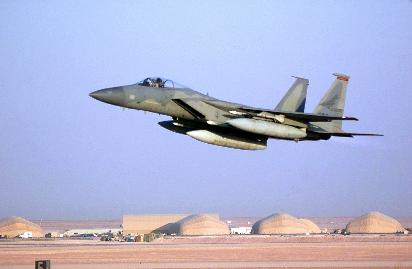 Jun 23, 2005, 02:38 - With a small ceremony on April 26, 2003, control of Prince Sultan Air Base was handed back to the government of Saudi Arabia. Since the mid-nineties it had been the premier US air base in the region and the nerve center for all air force operations in the Gulf. As the home of the Combined Air Operations Center (CAOC), the base was the primary command and control facility responsible for orchestrating the air campaigns for both Operation Southern Watch in Iraq and Operation Enduring Freedom in Afghanistan.
Jun 23, 2005, 02:38 - With a small ceremony on April 26, 2003, control of Prince Sultan Air Base was handed back to the government of Saudi Arabia. Since the mid-nineties it had been the premier US air base in the region and the nerve center for all air force operations in the Gulf. As the home of the Combined Air Operations Center (CAOC), the base was the primary command and control facility responsible for orchestrating the air campaigns for both Operation Southern Watch in Iraq and Operation Enduring Freedom in Afghanistan.
The timing of the closing of PSAB seemed odd, coming just weeks after the official start of military actions in Iraq. It should have, at the very least, caused unwanted logistical problems for the Pentagon and regional commanders, but it didn't. A contingency plan had long been in the works, not only for Prince Sultan Air Base, but also for the entire map of the Middle East, including Iraq.
|
Long before the US pullout, a new home for the operations had secretly been built in the deserts of Qatar. What had been in October 2001 "nothing more than a runway and a field of sand covered by two-dozen tents and a few warehouses", the Al Udeid Air Base was transformed in a few short months into one of the largest air bases in the world.
Published reports and official DOD statements claimed that the amazing transformation was the result of the heroic response of US servicemen to the tragedy of 9-11. A determined military had beaten indeterminate odds to transform a barren wasteland into a state of the art military base in order to "take the war to the terrorists". The true story of the building of Al-Udeid is actually quite different. The planning for the mammoth base had in fact taken place long before Sept. 11, and actual work on the base began as early as the spring of 2001. The building of Al Udeid turns out not to be a "miracle in the desert" in response to a heinous attack, as touted by the military, but rather a required step on the path to regime change in Iraq. It has long been accepted knowledge that the Bush Administration was working feverishly towards regime change in Iraq during the 18-month period between 9-11 and the official start of the war in March of 2003. The Downing St Minutes confirmed that the Administration was set on a path to war at least as early as mid-summer of 2002. The accounts of Paul O'Neil and Richard Clarke verified that Iraq was a front burner issue for the Administration from the very first day, and only intensified after the attacks. Yet finding hard evidence to prove that planning for the war in Iraq was taking place prior to 9-11 has been hard to find. A look at the building of Al Udied can provide that evidence.
THE BUILDING OF AL-UDEID (THE OFFICIAL STORY)
On October 2, 2001 a rapid-response team of civil engineers, the 823rd RED HORSE Squadron whose specialty is to repair and build structures such as runways and roads in remote areas, arrived. According to the accounts of the 823rd, the Qatar base "was nothing more than a runway and a field of sand covered by two-dozen tents and a few warehouses". Since there was no room in the warehouses for the RED HORSE airmen to sleep, they moved into an expandable shelter on the flightline and lived and worked out of there They had come to begin the largest construction project ever undertaken by a RED HORSE team; a $9.1 million military construction project that consisted of building a 1,240- foot by 630-foot concrete ramp with taxiways, shoulders and lighting. While waiting for funding and approval for the ramp project, the RED HORSE troops spent two months doing other base projects, like building the operations center and helping set up the tent city. Finally in January 2002 ramp construction began. The completed ramp, as big as 8 football fields, was finished in late March. As March 2002 began, the airfield was still classified as "Secret".
At the time US central command spokesman, Major Ralph Mills confirmed the equipment movements but insisted they represented business as usual. Mills told reporters, "This is not uncommon. This is status quo. We are moving stuff from point A to point B, this is an ongoing process." Dick Cheney also denied there were any plans to close Prince Sultan AB, claiming no decision had made to change military positions with respect to Saudi Arabia. By June of 2002 the work on the first phase Al Udeid was nearing completion. On August 7, 2002
A HIDDEN HISTORY OF AL-UDEID (PAVING THE ROAD TO WAR IN IRAQ)
Since the first Gulf War, the US had had limited military agreements with Qatar. In 1992, a Defense Cooperation Agreement was signed that permitted "access and prepositioning" of US assets in the country. In November, 1995 another agreement to host "several Air Expeditionary Force deployments" was reached. Yet as of 2000, Al Udeid had been mostly ignored, but that was about to change. In 2000 the US planned to to use Al-Udeid as a munitions storage facility according to The International Campaign to Ban Landmines (ICBL) 2000 report released in the fall of that year.
ICBL Report 2000: Qatar
Additionally, based on U.S. Air Force plans for its war reserve ammunition stockpiles in the Persian Gulf region, U.S. Gator antipersonnel mines, as well as Claymore mines, may be introduced and stockpiled at the Al Udeid area in Qatar in the near future. U.S. Air Force documents indicate that the Al Udeid storage facility will eventually contain 142 CBU-89 Gator mine systems, each with twenty-two antipersonnel mines, and 141 M18/M18A1 Claymore mines The ICBL 2001 report, which was completed just prior to 9-11 confirmed that the munitions storage plan had in fact gone into effect. Located in the remote desert region of Qatar, Al-Udeid was a perfect candidate for this kind of usage. But munitions storage facility would not last long. As the Bush administration came to power they had new plans for the air base, plans that would clear the path to war with Iraq. By March 2001 the Air Force began investigating moving operations to the Al-Udeid. According to a Congressional report given by Defense Secretary Donald Rumsfeld, the airfield was now being looked at as potential US base. In his annual Allied Contributions to the Common Defense Report , Rumsfeld stated:
This was the first time the use of Al-Udied as a potential base for US air operations was officially acknowledged. Back in April 2000, then Defense Secretary William Cohen had been asked about the use of Al-Udeid at a press conference in Kuwait. He acknowledge that he had "discussed ways in which Al-Udeid may be used in the future, in a crisis situation" with the Qataris, but no agreement could be reached. Obviously the new administration had more luck with the Qatari negotiations then its predecessors. In June 2001 communications capabilities were completed at Al Udeid
Around the same period, Alaswar Technology Group Co (aka.Al-Aswar Electronic) of Hawally Kuwait supplied and installed two "60 foot guy masts, microwave dishes and allied works" in Qatar; one at the Saliyah Army Base, the other at Al-Udeid. Whether these communication dishes were part of the work Bill Goodman was doing cannot be known. What is known is that the US military had personnel working at Al-Udied long before the Sept 29, 2001 date always claimed to be the first time US servicemen set foot at the base. In the Summer of 2001 construction contracts for the airbase began to go out for bids. On August 9, 2001 bids went out for a "contractor owned-contractor operated" fueling station for both fighter and cargo planes as well as a diesel and automotive gasoline facility for ground vehicles. Also in the bid was a fueling station for mobile aircraft refueling vehicles and a commercial tank truck receiving facility.
On Sept 7, 2001, according to company news releases, a contract was awarded GSCSGulf to build "administration facilities, a worker break room, ablution facilities, an outside storage area, a loading dock, FMSE facility, and a generator run up." Later in the month GSCSGulf was awarded two contracts farmed out from DynCorp. One was for a Fuel Receiving Point, the other for a Bulk Fuel Storage facility. "The projects (were) to be built under expedited construction schedules in order to ensure fuel systems (were) in-place for incoming USAF tanker squadrons deployed as part of Operation Enduring Freedom."
GSCS Chosen to Build WRM Support Facilities
(7 September 2001) GSCS has won a contract to simultaneously construct 10 minor construction projects in support of the US Air Force War Reserve Material (WRM) program at Al-Udeid Air Base, Qatar. Individual projects include: administration facilities, worker break room, ablution facilities, outside storage area, loading dock, FMSE facility, generator run up DynCorp Selects GSCS to Construct USAF Fuel Systems GSCSGulf was awarded two more contracts during this period. Both had been won competitively, hence bids had been taken. Although it is impossible to know how the events of 9-11 affected the bid review and acceptance process, even under expedited conditions it seems highly unlikely that any but the last contract would have been initiated after 9-11 given the DOD's usual 60 to 120 day turn around time.
GSCS Wins Tent-City Site Preparation Contract
(3 October 2001) GSCS has been competitively awarded a contract for the emergency preparation of 61 acres of outside open area in support of a US Air Force tent city to be erected at Al-Udeid Air Base, Qatar. Work includes: excavation, backfilling, soil compaction, trenching for electrical cables, application of rock aggregate, construction of drainage ditches, access roads with culverts, parking areas, interior access corridors and perimeter earth berms. GSCS Wins RMS Contract for USAF Aircraft Parking Apron Materials
October 2001 satellite images showed extensive work had already been completed at Al-Udeid THE ROAD TO WAR WAS PAVED WITH PROPAGANDA
Able to use the smoldering embers of the World Trade Center as a canard to sell a "global" war on terror to not only the American people, but to those who would fight it, the Administration was able to cover their tracks with a web of misinformation. Al-Udeid was never intended as a frontline in a war against the terrorists of 9-11. It was planned as the frontline for something far different; the "War on Terror", which was nothing more then a clever repackaging of the plans for Iraqi regime change that began with the first Gulf War. The level of misinformation can be illustrated with a simple story coming from the building of Al Udeid: According to the official DOD history of Al Udeid, the first fatality of Operation Enduring Freedom was a civil engineer, Master Sgt. Evander Earl "Andy" Andrews who died on Oct. 10, 2001 in a construction accident. To honor Andrews, the sprawling tent city at Al-Udeid was christened "Camp Andy". The story of "Camp Andy" is oft told in press accounts about the base and is a cornerstone in the fašade of the official account. Left out of the official story is the fact that since the existence of the base was classified at the time, the military initially announced only that the fatality occurred somewhere in "Southwest Asia", and his parents waited months to find out what had really happened to their son.
This is the first in a three part series by the IRAQFACT working group on military activities prior to Congrssional approval for war |
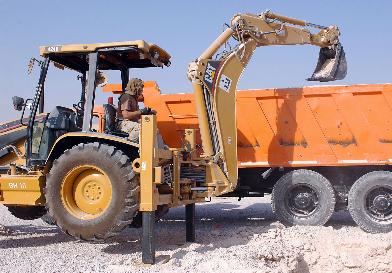 According to
According to 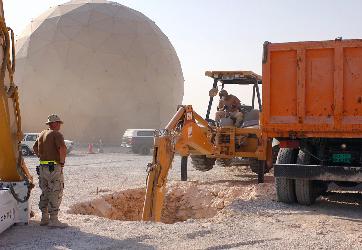 Within ten days of Cheney's visit,
Within ten days of Cheney's visit, 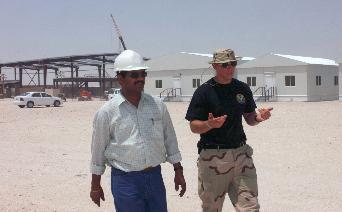 As the Bush Administration came to power in January 2001, the sound of war drums began beating along the Potomac.
As the Bush Administration came to power in January 2001, the sound of war drums began beating along the Potomac. 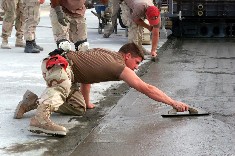 As any chess player can attest, the game is most often won or lost in the first few moves. The Bush Administrations plan for regime change in Iraq was much like a chess game, each piece needed to be in place before the gambit. Although the grand schemes were hatched in the plush offices of right wing think tanks and corporate boardrooms, the heavy lifting was done by simple pawns in the hot deserts of the Southwest Asia, long before the first rumbles of shock and awe were ever heard.
As any chess player can attest, the game is most often won or lost in the first few moves. The Bush Administrations plan for regime change in Iraq was much like a chess game, each piece needed to be in place before the gambit. Although the grand schemes were hatched in the plush offices of right wing think tanks and corporate boardrooms, the heavy lifting was done by simple pawns in the hot deserts of the Southwest Asia, long before the first rumbles of shock and awe were ever heard.